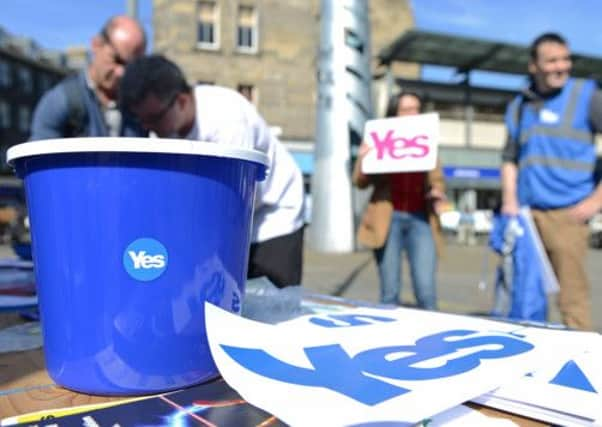Robin McAlpine: Taking politicians out of politics


I DO not share the generalised contempt for politicians that seems to be the norm in Britain these days. Most of the politicians I’ve worked with got into politics for principled reasons and most are still driven by a desire to do the right thing – even in the face of permanent, intense media scrutiny.
But the flaws in party politics are well-known. You put out a pretty good but far from perfect white paper (a white paper is intended to be a discussion document) and the inevitable logic of political knockabout means that within a couple of months you are defending every line of it verbatim, as if it were a holy text.
Advertisement
Hide AdAdvertisement
Hide AdOr you come up with a decidedly modest proposal for extra powers to be given to the Scottish Parliament and, in the heat of debate you find yourself calling it radical transformation.
We just shrug and accept that you can’t have politics without politicians – occasionally wondering what it would look like if you could. Well. it would look like the nightly reality of the independence campaign.
The Yes campaign on the ground is really hundreds of autonomous local campaigns, each raising their own money and running their own events. They put on meetings for non-political audiences and they are constantly trying to make sure that platform speakers are mainly non-politicians. They want people who are not giving prepared answers or reading from a script.
In the space of four weeks in March I spoke at 18 public meetings. Multiply it and that would be 60 or 70 speakers on platforms in town halls all over Scotland. Of all of those speakers, you could count the number of elected politicians on your fingers, and most of those were local councillors with particular local knowledge.
So in a town hall somewhere near you tonight you can get the perspective of the campaigning non-politicians of Business for Scotland, or National Collective or Women for Independence, or Asians for Independence, or Trade Unionists for Yes or Labour for Independence or the Radical Independence Campaign – not to mention dozens of individual campaigners and writers. I’ve been at plenty of political meetings over the years but these are different. They are much busier, have a different tone and audience responses are different.
Unfairly or not, members of the public listen to politicians with great suspicion and ask questions such as: “Why didn’t you…?” With non-political speakers you sense people trying to glean as much information as they can. They ask, ‘could we…?’
And what is true in public meetings is true in spadefuls on social media where the No campaign is being outpaced by the Yes campaign three to one. It is exactly because the caricature of a campaign being run by “cybernats” from an SNP-funded bunker isn’t true that its reach is so effective.
If you talk to shifting voters, they are sick of the media campaign altogether. They are looking for other sources. Trace those sources and more often than not you’ll find someone at their work or among their friends and family who has been at a meeting or had a debate on Facebook.
Advertisement
Hide AdAdvertisement
Hide AdThat friend starts forwarding them material, probably from Business for Scotland or the Radical Independence Campaign and probably not from the SNP. It is this chain reaction which is moving the polls. To be able to feel passionate about politics without having to be branded with party colours is very attractive to a lot of people.By comparison the No campaign is still in a sort of feudal top-down mode. Former prime minister and chancellor Gordon Brown swings his big, clunking fist at a thousand butterflies – all grunt, no connection.
Because the No campaign hasn’t given birth to a spontaneous grassroots movement, its leaders seem to assume that everyone on the other side must be a fake or a con, a front group or a stooge. They just don’t seem to get what’s actually happening.
The really exciting possibility is that this doesn’t end. A highlight of the campaign for me was walking out of a community centre in a working-class area of south Edinburgh with a local grandmother.
“I’ve never done anything like this in my life before but I’m putting leaflets through doors because I feel so strongly” she said. “And you know what, when this is over I’m not going back to my sofa.”
I hear a version of that story everywhere I go.
What happens if Scotland gets off its sofa and stays off its sofa? What happens if people start to demand a right to participate in decision-making? What if the language of this campaign wakes people up to the complete lack of community democracy in Scotland?
Or to put it another way, what if political party managers think they can get back to business as usual, managing a docile population for its own good after 18 September? What if the population refuses to be docile?
Better Together has run a 19th-century campaign in a 21st-century nation – and has been found out. We no longer accept being told what is good for us by “important people” – or not like we used to.
I suspect that there will be casualties right across Scottish politics after this campaign, as patience for control freaks and we-know-what’s-good-for-you attitudes drops among people who have seen open, trusting, participative politics in action.
Advertisement
Hide AdAdvertisement
Hide AdIn turn, I suspect that Scotland’s future political leaders will be the ones who capture the spirit of this change, not cynically but because they believe it.
l Robin McAlpine is the director of the Jimmy Reid Foundation